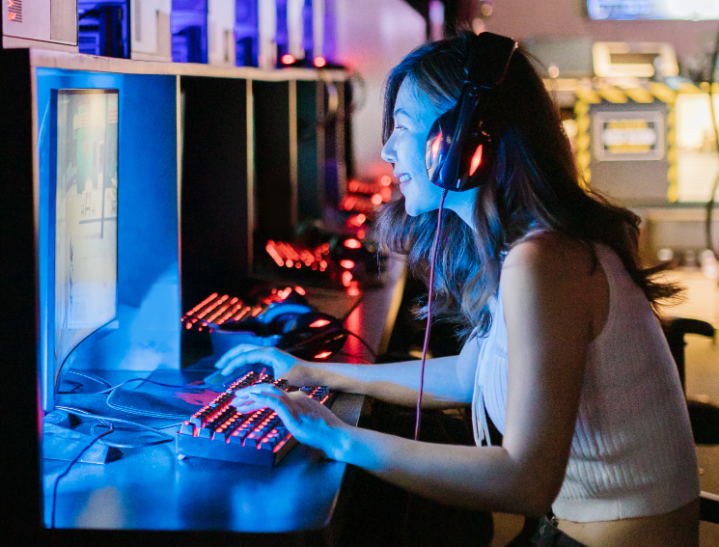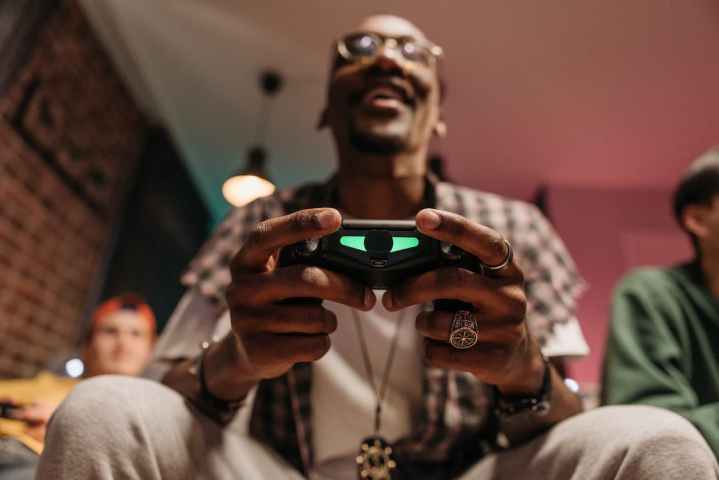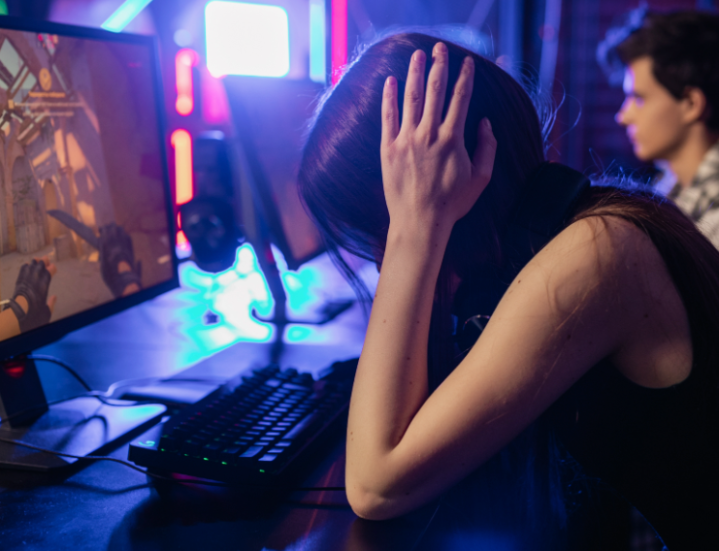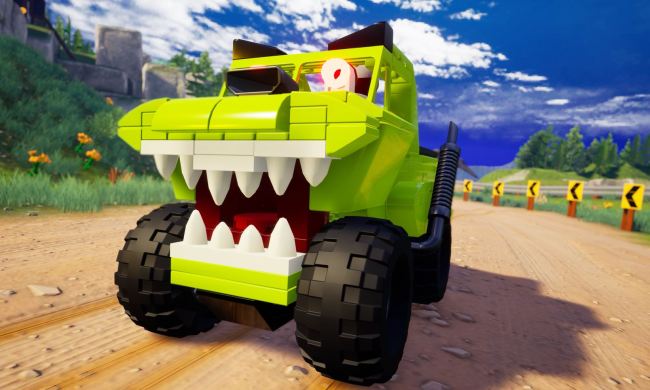
Video games are an undeniably great way to unwind, escape reality, and have some fun — but they’re also a double-edged sword. Under certain circumstances, playing video games can easily morph from a fun and lighthearted activity to a problematic behavior that leads to irritability, addiction, and social isolation. So what’s the best way to navigate this slippery slope? Is there a way to reap all the mental health benefits of gaming while avoiding the pitfalls?
To get some guidance, we got in touch with Dr. Kelli Dunlap, a clinical psychologist, game designer, and educator with a passion for all things gaming and mental health. Here are a few tips and tidbits that will help you make sure that gaming is beneficial to your mental, emotional, and social well-being.

Digital Trends: Most of the conversation about “positive” gaming hinges on the “right” kinds of games — e.g., tame, cutesy games like Stardew Valley or Mario Kart. But what if you don’t like those types of games? What if you’re into fighting games, shooters, or survival horror? If you enjoy playing games with rivalry, gore, violence, and so on, what can you do to ensure you’re getting positive mental health benefits in that kind of environment?
Dr. Dunlap: That’s the wonderful thing about games, there are almost limitless possibilities to choose from. Our mental health benefits most when we’re engaged in something that we either enjoy or find meaningful. If you enjoy planting crops, that’s awesome. If you enjoy explosions, that’s also awesome. Playing games is about attending to those parts of yourself that recharge your batteries and there’s no one game or genre of game that fits the bill for everyone. As my mom always says, “do what makes your heart happy.”
Is there any one type or genre of game that provides more mental health benefits than others? Similarly, are certain types of games better for specific age groups? For example, puzzle games for older adults?
No one game or type of game is going to be beneficial for every person. When looking at games to provide mental health benefits, it’s a bit like a doctor writing a prescription. You need to know about the person, their history, and their needs, as well as their interests and abilities. It can be helpful to think about the mental benefits of gaming as psychological weightlifting. Want to work on your creative problem-solving? Try a puzzle game! Is the world feeling stressful and out of control? Try a simulation game, like The Sims, to bring a sense of peace and control.
With many games explicitly designed to keep us hooked and in-game, playing into the brain’s natural reward system to ensure we keep playing for as long as possible, how can we avoid addictive behavior? What steps can we take when the game we’re playing is built for addiction?
Some games use “dark design patterns,” a style of designing that preys upon vulnerabilities in our processing of information, social relationships, and emotions. Celia Hodent has done brilliant work in this area. In terms of what players can do, the simplest answer is to check in with yourself and make sure that you’re still enjoying what you’re doing. Gaming can be a deeply engaging activity and, from the outside, it can be really hard to tell the difference between high engagement and problematic play.
But one of the key differences is that engagement makes us feel “The Good Feels,” things like a sense of accomplishment or relaxation. A sign of problematic play is that the play isn’t enjoyable anymore — it feels like work, or a grind, or that if you don’t log on, that something bad will happen (e.g., progress lost, missing an opportunity, letting others down). Sometimes games are frustrating, and there can be a sense of grind or drudgery, but if that’s the bulk of your experience, it’s probably a good idea to reevaluate your relationship to the game.

In order to reap the most mental health benefits from gaming, is there an optimum gaming session time we should be aiming for? We hear a lot in the media about the negative effects of gaming for too long and too often. Do we continue to reap the same positive mental health benefits during lengthy play sessions, or is short and sweet better?
There’s no one-size-fits-all prescription for time spent gaming. A recent study by the Royal Society basically says time spent playing doesn’t matter. Typically it’s why you play that matters, not for how long.
Are you playing because you’re having fun, hanging out with friends, saving the world, or proving your skills? Or are you playing because you feel like you need to, because you need to grind for that next level, or the raid team is counting on you? Playing for enjoyment, excitement, relaxation, and connection is a way we get our basic needs met. But if we’re playing out of a sense of obligation — play feels like work or a chore — then it’s time to reevaluate our relationship with the game.”
In an era of online MMORPGs, co-op shooters, battle royale games, and VR, how can we protect our mental health when gaming co-operatively online with strangers? Do these games offer different benefits or risks to our mental health?
I’ve made some amazing friendships through online gaming. Some I’ve had the opportunity to meet in person at conventions or events, and some I only know the sound of their voice. Online friendships are “real” friendships, despite what many headlines may tell you. However, most people, when they game online in social settings, are playing with people they already know. Kind of like a club. And, similar to a club, it’s not really about the game or activity itself, but rather the culture and social norms within that club.
For example, some game communities are incredibly toxic while others are gosh-darn wholesome. Protecting your mental health would mean taking into consideration the tone and culture of a game’s community and, if that community has some toxicity, taking steps to protect yourself. For example, I’m a huge Halo fan and love playing online multiplayer. However, I stay in a party chat (private voice chat) with my friends while I play and don’t interact with the “randoms” on my team or on the other team. I wish I didn’t have to take the extra steps, but doing so minimizes the likelihood of encountering harassment or abuse while allowing me to hang out with my friends.

What about if you already have mental health issues such as depression or anxiety? Can gaming help? Is there a specific type or genre of game that, say, somebody with anxiety would benefit more from playing (and equally, any game genres to avoid)?
Games are not a replacement for mental health treatment, but they can be a tool in recovering from or managing mental health issues. Many people use games as a way to help them handle difficult situations or times in their lives, and this includes managing psychological challenges like depression and anxiety. There are countless personal stories from gamers about how games helped them by giving them something to look forward to, [making them] feel connected to others, or [allowing] them to feel in control or competent.
What kind of games produce these benefits is deeply individualized and personal. Some people with depression prefer games that allow them to escape, to exist somewhere else where depression can’t get them. Others might enjoy playing games about depression or with depressive themes because it helps them feel validated to hear and see their experience acknowledged. Similarly, someone with anxiety may avoid horror games (like me!), while others might enjoy horror games because those games produce a kind of anxiety they are in control of.
Many parents don’t allow their kids to play violent, gory, or creepy games as they worry it’s damaging to mental health. Is there actually any evidence to support this? Could these types of games have their own unique benefits or merits?
Research on violent video games has found time and time again that there’s no relationship between violent video game play and violent behavior. Playing violent video games does not make someone act in violent ways. There is, however, something to be said about the developmental appropriateness of a game. For example, I don’t let my 6-year-old son play Call of Duty — not because I worry that a violent game will cause violent behavior, but because it’s not appropriate content for a 6-year-old.
I also don’t let my 6-year-old see R-rated movies or watch mature-rated television shows. Being exposed to content that’s not developmentally appropriate, no matter the medium, can have negative impacts. If a parent thinks their kid isn’t ready to play a particular type of game, that’s a great opportunity for parent and child to sit down and have a conversation about gaming, maturity, and safety.”
With your years of experience as a clinical psychologist and game designer, what would be your top five tips to boost mental health with gaming, taking into consideration the above and anything else you think is important?
- Make sure you’re having a good time! I used to play competitively, and I got to the point where I was worn down, burned out, and not enjoying my gaming. If you aren’t getting what you want from your gaming (e.g.,relaxation, hanging out with friends, sense of accomplishment), take a second to reflect and reevaluate.
- Have a varied play diet. I love trying new games and different types of games. Video games, board games, card games, role-playing games … there’s so much out there to experience.
- If you’re a parent, play with your kiddo. My crew does Pokémon Go together as a way to get out of the house. We also play Sonic and Mario and other games that my 6-year-old can play, and it’s a great way for bonding as a family, as well as teaching things like persistence (it’s OK, kiddo, try again!), teamwork, and creativity.
- It’s OK to like what you like, even if no one else does. Gaming has some issues with gatekeeping around terms like “casual gamer” or “hardcore gamer,” signaling that some games aren’t REAL games. Play what you like and ignore the haters.
- Make time for play in your life. Just because we grow older doesn’t mean we grow out of our need for play and recreation. Your worth is not dependent on your productivity, so make time for frivolity, silliness, and playfulness.
Follow Dr. Kelli Dunlap on Twitter for more gaming content with a mental health slant.



